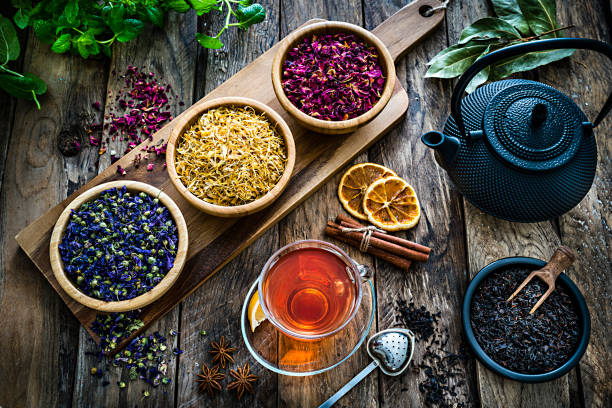
Now when it comes to nutrition and your health, everyone always mentions what foods to incorporate into your diet to keep up a nutritious lifestyle. You’ll hear citrus fruits, peppers and potatoes add more vitamin C into your diet, or eating certain dishes that contain salmon, tuna or other types of fish will help incorporate more vitamin D into your diet. Regardless of what they say, fruits and veggies are key to having a healthy diet and can come in handy when battling sickness and diseases. With that being said, food can be an aid to medicine right? Correct, so what about liquid beverages? Everyone knows about water and how you’re supposed to drink at least 32 oz or more daily, depending on your body type but what about tea? Can the coffee alternative be the detox your lungs have been begging for?
The Benefits Of Drinking Tea
Tea has been around for centuries and can be traced all the way back to China. In the earlier days of civilization, drinking tea was for medicinal purposes only, but once the 3rd century came around, it became common to see people drinking it every day when tea cultivation and processing began.
During this time, many argued and wondered if drinking tea every day was beneficial for one's health and even though they weren’t sure, they still continued as if it was. Though they did not have the proper medical research at the time back then to prove if this was true or not, it is known today that drinking tea comes with many health benefits.
Certain studies show that drinking tea can help with so many medical issues that one may face. For example, green tea has properties that have cancer-preventing effects. It has also been noted that drinking tea can help with the prevention of certain diseases related to your cardiovascular and metabolic health.
RELATED: The 7 Best Teas for Clearing Your Lungs detox tea
Properties In Tea That Can Help With Your COPD
Though there are many different types of teas out there to consume, it will make life a whole lot simpler if you find a tea that addresses your specific concerns. COPD is a type of lung disease that is the third most common cause of death all throughout the world. It can develop from many things such as smoking, air pollution, tuberculosis and more.
When living with COPD, look for teas that have antioxidant and anti-inflammatory properties. Teas that have antioxidant and anti-inflammatory properties are usually made up of phytochemicals. These phytochemicals can help protect the lungs from stress and injury.
Something that can also be found in tea to help with medical conditions is theophylline. Theophylline has muscle relaxing properties and is usually given as a drug to people living with COPD and asthma. There also may be the possibility that long-term consumption of theophylline can also help prevent the risk of getting COPD.
RELATED: Teas That Improve Your Skin detox tea
7 Teas You To Help Your Lungs
Now that it’s been discussed what properties to look for when wanting to add tea to your diet for aid and prevention, it’s time to discuss which teas contain these properties. These first set of teas are the ones that actually contain the phytochemicals and theophylline compounds that you need for soothing and prevention when it comes to COPD:
- Green Tea
- Black Tea
- Oolong Tea
Sips Tea: 5 Teas To Always Keep In Stock detox tea
These next set of teas are teas that consist of multiple herbs that have other benefits to your health such as weight loss and help with other respiratory problems:
- Yogi Breathe Deep Tea (Lung Congestion)
- Lifestyle Awareness Respiratory Balance Tea (Coughs and Colds)
- Traditional Medicinals Breathe Easy Tea (Breathing Conditions & Asthma)
- Traditional Medicinals Organic Throat Coat Tea (Throat Congestion and Irritation, Cough & Cold)
They also help with soothing symptoms that come with flare-ups such as pain from inflammation and irritation.
RELATED: 5 Reasons to Start Drinking Tea Today! detox tea
Your How-To Guide To Drinking Tea
So now that you know what to drink, let's discuss how to do it. It may seem like common sense but in order for you to actually enjoy what you’re drinking and not get discouraged if it doesn’t taste as well as you would like or you don’t enjoy your first experience, here are some helpful tips on how to consume tea:
First, add something else. Not all tea tastes good by itself. Try adding honey, lemon and or a sweetener that isn’t sugar (if you have it) to your tea. This will help with flavor.
Secondly, try starting out drinking a cup of tea every morning, and then once you get the hang of that, try adding it to your night routine as well. The more consistent you are, the better it can help you.
Lastly, make sure you try multiple flavors and teas, you don’t need to stick to one specifically so do your research.
Just like tea has many health benefits, it can have some qualities that may not benefit you. So make sure to be mindful and aware. Tea is great, but what it does for you can be even better.









